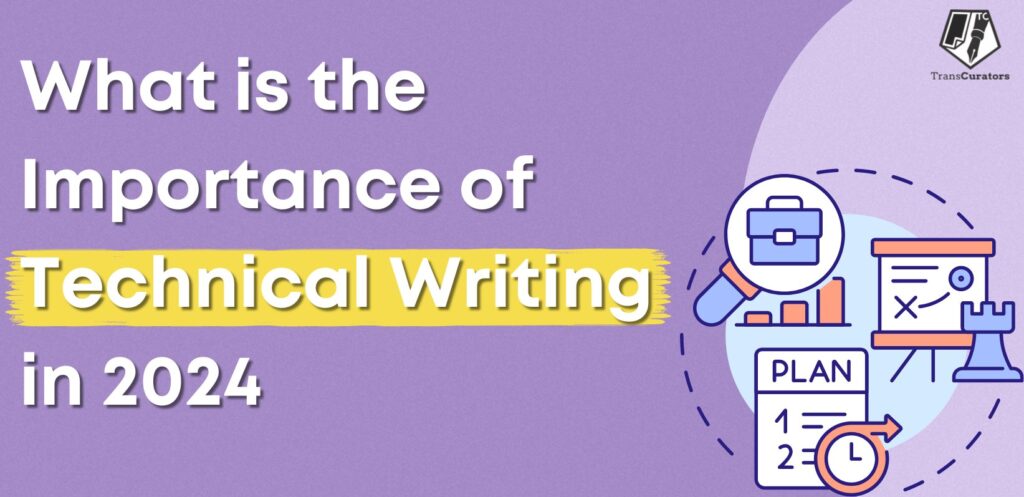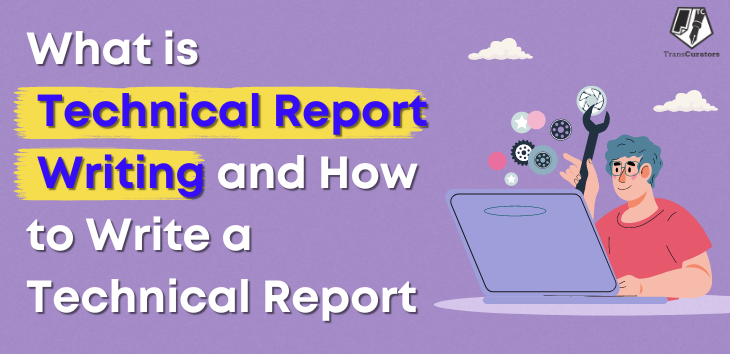
The importance of technical writing cannot be overestimated by 2024. Clear, straightforward documentation is the building block of effective interaction in today’s constantly complex technological environment. From manuals for software to healthcare protocols, technical writing ensures that information is not only available but also understood to a wide range of audiences. It is essential for improving operating efficiency, eliminating errors, and fostering innovation. As industries evolve and technology advances, the ability to effectively convey technical information is important for achieving organisational success while satisfying the needs of a global audience. As businesses navigate rapid technological advancements, mastering the art of technical writing becomes a strategic advantage. Learn more about its vital role and how to leverage its benefits to propel your organisation forward in the digital age.
What are the Roles of Technical Writing in 2024
Enhancing Clarity and Understanding
In the modern world, where technology is continuously evolving, technical writing ensures that information is conveyed effectively and clearly. Technical writers condense complex concepts into simple instructions, whether in the form of user manuals for new software, safety measures for advanced machinery, or guidelines for medical devices. The ease of use of these devices facilitates effective maintenance, operation, and troubleshooting for both experts and customers.
Improving User Experience
Technical writing has a direct influence on the user experience by increasing product accessibility. Well-written instructions reduce frustration and misunderstanding, allowing users to access features or solve problems independently. Clear instructions and troubleshooting guides save time, increase productivity, and reduce support calls. This favourable experience promotes customer trust and loyalty, which benefits the brand and increases satisfaction levels.
Supporting Innovation and Development
Science and technological innovations often call for comprehensive documentation to go along with new products or processes. Documenting research findings, product specifications, and experimental protocols is an important function of technical writers. Technical writing guarantees that information is conserved and accessible for future research, development, and improvement by accurately describing these innovations.
Ensuring Compliance and Safety
In regulated industries like healthcare, aerospace, and finance, detailed documentation is critical for adhering to industry standards and regulations. Technical writers generate paperwork outlining safety procedures, quality standards, and legal requirements. This paperwork not only helps organisations comply with rules but also safeguards the safety of users and stakeholders.
Facilitating Training and Education
Effective technical writing is required for training programs and educational materials. Whether onboarding new employees, teaching customers how to use new software, or giving training manuals for complex devices, clear and organised documentation speeds up learning and understanding. Technical writers provide manuals, tutorials, and e-learning modules that help learners acquire new skills quickly.
Supporting Global Communication
In today’s globalised economy, businesses operate across borders, serving diverse markets with different languages and cultural backgrounds. Technical writing transcends language barriers by providing standardised material that can be translated and localised for other regions. This maintains information consistency across foreign marketplaces, improving communication and accessibility for all users.
Increasing Efficiency and Reducing Costs
Well-written technical documentation boosts operational efficiency by lowering mistakes, simplifying procedures, and decreasing downtime. Clear instructions help users and employees to do things correctly the first time around, reducing the need for ongoing assistance and debugging. Organisations benefit from such effectiveness since it lowers support costs and improves overall productivity.
Supporting Decision-Making
Technical writing offers decision-makers with precise and reliable information to help them make strategic decisions. Whether analysing new technologies, assessing a project’s feasibility, or understanding market trends, good documentation allows stakeholders to make informed choices based on precise information. Technical writers collect data, analysis, and recommendations into reports that help organisations plan their strategy.
Adapting to Technological Advancements
As technology advances, so does the demand for technical documentation that supports advancements. Technical writers remain up to speed on evolving technologies, tools, and platforms in order to adequately chronicle cutting-edge advances. Technical writing adapts to emerging developments, such as artificial intelligence and blockchain technology, to guarantee that customers comprehend and efficiently employ these breakthroughs.
Promoting Professionalism and Reputation
An organisation’s reputation is strengthened by professional and clear documentation. Technical writing exhibits professionalism by providing data in an organised, logical fashion. It improves a product or service’s credibility by assuring stakeholders and customers of its quality and reliability. Users are more likely to trust a brand that produces consistent, well-written documentation.
In 2024, technical writing remains critical for fostering clear communication, enhancing user experience, fostering innovation, guaranteeing compliance, and enabling successful operations. As technology advances and industries evolve, technical writers serve an increasingly significant role in the achievement and growth of multiple sectors.
What qualifications will a technical writer need to have in 2024?
In 2024, qualifications for a technical writer typically include a combination of educational background, skills, and experience. Here are the critical qualifications expected of technical writers:
Educational Background:
A bachelor’s degree in English, Technical Communication, Journalism, Computer Science, Engineering, or a similar profession is often preferred. Some companies might require a master’s degree for specific roles or industries.
Writing and Communication Skills:
Strong writing skills, including grammar, style, and precise ability, are required. Technical writers must be able to convey complex information clearly and succinctly to their target audience. Excellent communication skills are necessary to work with subject matter experts (SMEs) and understand technical concepts.
Technical Knowledge:
Familiarity with technical disciplines relevant to the industry is essential. Understanding software, engineering, healthcare, finance, and other specialised sectors requires knowledge of terminology, methods, and ideas. Maintaining technical expertise requires continuous learning and being up to speed on industry trends and innovations.
Research Abilities:
Technical writers must have strong research skills to gather knowledge from various sources, including SMEs, documentation, and technical specifications. They must be able to analyse technical data and translate it into understandable content.
Attention to Detail:
Precision and accuracy are essential in technical writing. Technical writers must pay attention to detail to ensure their documentation is error-free and meets quality standards.
Tools and Software Proficiency:
Proficiency with technical writing tools and software is necessary. This includes word processing software (e.g., Microsoft Word), documentation tools (e.g., Adobe FrameMaker, MadCap Flare), content management systems (e.g., WordPress, Drupal), and graphic design tools for creating visuals (e.g., Adobe Illustrator, Visio).
Project Management Skills:
Technical writers often work on multiple projects simultaneously. Strong organisational and project management skills are necessary to prioritise activities, fulfil time constraints, and successfully collaborate with teams.
Experience:
Prior experience in technical writing or a related field is beneficial. This can include internships, freelance work, or entry-level positions where practical experience in writing technical documentation was gained.
Certifications:
While not always required, certifications in technical writing or specific software tools can enhance a technical writer’s credentials, such as certifications from the Society for Technical Communication (STC) or vendor-specific certifications for documentation tools.
Soft Skills:
Soft skills such as problem-solving, critical thinking, teamwork, and adaptability are valuable. Technical writers often collaborate with diverse teams and must be able to adapt to changing project requirements and priorities.
Conclusion
In 2024, a technical writer must possess a blend of educational qualifications, technical knowledge, strong writing and communication skills, tool and software proficiency, research abilities, attention to detail, project management skills, relevant experience, and soft skills. As technology and industry standards evolve, adaptability and a dedication to continual learning become more essential. Visit Transcurators for more information.
Frequently Asked Questions
A1. Trends include:
The integration of AI and machine learning in documentation tools.
Increased emphasis on user-centered design.
The rise of structured content management systems for scalability and efficiency.
A2. Essential skills include writing proficiency, technical knowledge, attention to detail, research skills, and technical tools and software proficiency.
A3. By documenting research, product specifications, and processes, technical writing supports innovation by preserving knowledge and facilitating collaboration.
A4. Technical documentation ensures businesses adhere to regulatory standards, mitigating risks and avoiding legal complications.
A5. Technical documentation provides structured guidelines and procedures that streamline operations, reduce downtime, and improve efficiency.



